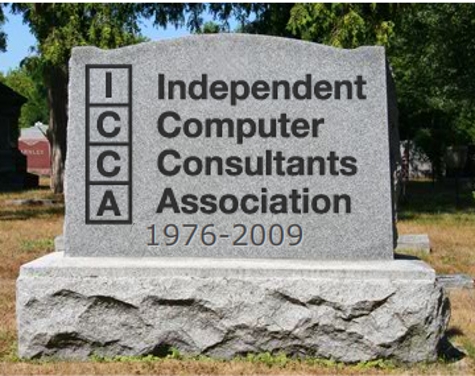Independent Consultants: Rest in Peace?


The Independent Computer Consultants Association (ICCA) a professional organization that assisted small computer consulting businesses in the United States for over 30 years shut its doors at the end of 2009. Under the current economic climate, Is the independent consultant itself also living on borrowed time?
Do you ever get that email or phone call when someone tells you that a mutual friend or a colleague had passed away some time ago? And then you get that sad feeling in your chest about being out of the loop and utter disbelief about what happened? That's what happened to me today.
Click on the "Read the rest of this entry" link below for more.
Today, via a mutual friend in the industry, I discovered that the Independent Computer Consultants Association, the ICCA, had closed its doors at the end of 2009. I was utterly gobsmacked on hearing this, because I had just interviewed the founder of the organization, Steve Epner, about their upcoming 2009 conference back in November in my Frugal Tech Show podcast that I do with Linux Magazine's and DaniWeb's Ken Hess. I was also extremely surprised to have not heard about this in the various mainstream technology web sites I read, so I suspect many of you probably didn't know about it either.
Also See: Frugal Tech Show, Interview with Steve Epner, ICCA Founder
Although I myself had not used the services of the ICCA since 2005, after shutting down my own business, which I maintained for about 10 years as a personal corporation and a subcontractor until I joined Unisys and then IBM, I felt this loss with a particularly heavy heart, because I knew that if such an established organization in our industry for helping small consulting businesses could fold, what of all the small consulting businesses themselves?
On its homepage, the ICCA cites economic challenges as the reason for its demise -- specifically, that many independents have had a severe decline in their revenue and/or the loss of their businesses completely, with many of their long-time members retiring or changing careers altogether. Some of them, like myself, went back into "Mainstream" employment. Today I came to the very sad and hard realization that I was a contributing statistic that led to this wonderful organization's downfall.
If a long-standing professional organization such as the ICCA can fail in today's economy, what about independents themselves? Do they still have a place in our industry, or will the big players make them an anachronism?
While I think it's very important and critical to our industry for the big players to remain healthy -- a biased view that I naturally have, being an employee of a large service delivery organization -- I also think that it's important that the independent shops, no matter how small stay healthy as well.
After all, we use a lot of these guys as subcontractors for highly specialized skill sets that we don't necessarily have in-house, or that are in short supply. And I'd like to think that someday, when I finish my professional career being a part of a large service delivery organization, that I'll have the option of returning to private consulting.
Hearing of the ICCA's demise hit me with a bit of an uncomfortable reality check -- returning to the industry as a private consultant may prove much more difficult than I originally thought. I remember what it was like to chase various head-hunting agencies that represented the big companies and to have to constantly sell myself in an unpredictable feast or famine type of environment. And that's when I was charging rates twice that of what a comparable independent usually gets now, in a booming economy.
These days, I still get the occasional e-mail from a recruiter who has my name in their database, and virtually everything I am sent is expected to be performed for insanely low hourly or per diem rates.
Customers going through these headhunters are almost always seeking form W-2 contractors (1099s, i.e. corp-to-corps need not apply unless you have a million dollars or more of professional liability insurance) or want to offer permanent positions with salaries that would be more appropriate for someone that is a first year out of college kid.
Of course, what these headhunters/placement agencies/body shops are frequently asking for on behalf of their clients is actually pretty complex and skilled work that only an experienced professional can perform. And those are the GOOD jobs. Sites like DICE.COM used to be full of independent work and long term contracts, but now what remains is almost entirely in-house for hire perm IT work, if it even exists.
I pinged a few of my freelancer friends and asked them if they thought independent consulting was dead or if they agreed with the ICCA's moribund description of the industry. While none of them thought it was "dead", we all seem to agree that the situation isn't very healthy either. Independents will need more and better ways to distinguish themselves and with unique services if they are to survive. And even if the economy does "come back", we all agree that the good 'ol days are long gone for the independent consultant, as a species.
Are you/were you an independent computer consultant and are re-evaluating your career options? Are you considering going back into the corporate IT workforce? What are you doing to keep yourself in demand and your business healthy? Talk Back and Let Me Know.
Disclaimer: The postings and opinions on this blog are my own and don’t necessarily represent IBM’s positions, strategies or opinions.